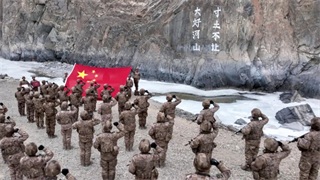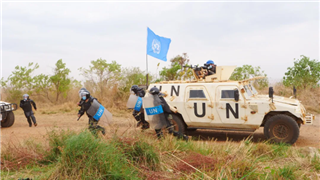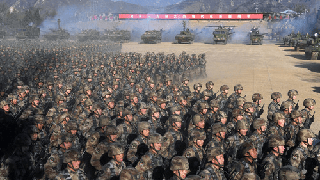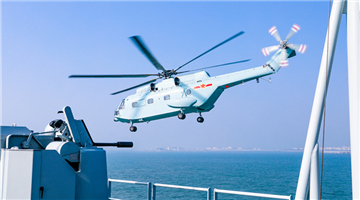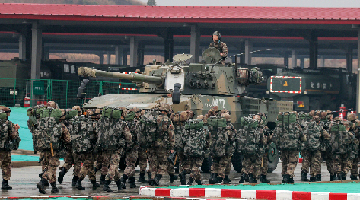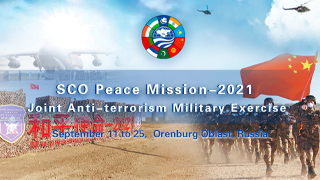刘庆彬
By Liu Qingbin
对于一直想在国际政治军事方面扮演“更重要角色”的日本来说,本月6日和7日或许是两个具有突破性色彩的日子。
January 6 and 7 might be two days of great importance for Japan that has been yearning to play a more important role in the international political and military stage.
6日,日本和澳大利亚领导人举行视频峰会;7日,日美外长、防长进行本年度“2+2”视频会谈。日本媒体认为,日澳和日美之间的这两次互动有一个共同点,那就是日本在所谓“印太军事安全”领域发挥的作用将越来越大。
Leaders of Japan and Australia held a video-link summit on January 6, followed by this year’s “two plus two” meeting between Japanese and American foreign ministers and defense ministers the next day. Japanese media reported that the two events both indicated that Japan will play a bigger role in the so-called “Indo-Pacific military security”.
首先,日澳此次将签署《互惠准入协定》(RAA),目的在于进一步加强国防和安全合作。这是与美国自1960年签订《驻日美军地位协定》以来,日本对外达成的第一个深度防务协定。有了这个协定,日澳双方或将进入"准军事同盟"关系,美日印澳“四方对话机制”中,日澳这条线上军事链条将大大加强,这也是美国近两年来一直在桌面下极力推动的。
For starters, Tokyo and Canberra will sign the Reciprocal Access Agreement (RAA) – the first in-depth defense agreement signed by Japan since the Agreement regarding the Status of United States Armed Forces in Japan signed with the US in 1960 – to reinforce their defense and security cooperation. The new agreement will bring Japan and Australia to a quasi-military alliance and largely intensify their military ties in the US-Japan-India-Australia “Quad” mechanism, a result the US has been pushing strongly under the table in the past two years.
其次,这次“2+2”会谈重点讨论的一个内容是日美制订的新版联合作战计划草案,而这个草案设想了“台湾发生紧急事态”环节。根据计划草案,日本将允许美军在必要时于西南诸岛建立临时攻击基地。从地理上看,日本西南诸岛距离台湾非常近,如果台海真的发生军事摩擦或冲突,美军可以第一时间借助日本的地理优势进行干涉或插手,而这实质上等同于日本也将卷入冲突之中。
For another thing, a key topic at the Japan-US “two plus two” meeting was a draft of joint combat program in the event of an emergency involving Taiwan. According to the draft, Japan will allow American troops to build a temporary attack base on its southwestern islands if necessary, which are geographically close to the Taiwan island. If military friction or conflict broke out across the Taiwan Strait, the US troops would be able to step in and interfere immediately leveraging Japan’s geographical proximity to the island, and that would be equivalent to embroiling Japan into the conflict too.
在成为经济大国之后,日本一直希望自己成为世界政治舞台上的“大国”,但在二战后的国际秩序体系之下,日本政治精英一直认为国家在发挥政治军事作用时受到了约束,国内和平宪法也令其手脚被缚。因此,日本一直寻找机会希望能撬开自己身上的“枷锁”。而现在,日本政治精英把美国在对华战略遏制中对日本的需要,视为绝好的机会。
Having grown into a major economy, Japan has been hoping to also become a major political power in the world, and its political elites believe the post-WWII international system and Japan’s Pacifist Constitution have tied the country’s hands in playing its due political and military role. Therefore, Tokyo has been seeking an opportunity to shed the shackles on it, and now its political elites are seeing such an opportunity in America’s need for Japan when pursuing strategic containment of China.
外交是内政的延续。日本积极寻求与澳大利亚和美国形成更深层的军事联系,实际上与日本前首相安倍晋三等人近期接连冒出“台湾有事,等于日本有事”等激进言论是相互呼应的。安倍在卸任后,其“右倾”的面目暴露得越来越明显。从自民党目前的行事逻辑来看,安倍派系的“如意算盘”是不仅要利用台湾问题修宪,甚至想在修宪后光速完成“征兵法”的制定。
Diplomacy is the continuation of internal politics. Japan’s eager attempt to forge deeper and tighter military connections with Australia and America corresponds with the radical remarks recently made by its former Prime Minister Shinzo Abe and other figures, such as “a Taiwan emergency is a Japanese emergency”. Abe has increasingly shown his rightist true color after stepping down from office. Judging from what the Liberal Democratic Party is doing now, Abe and his followers seem to count on using the Taiwan question as an excuse to not only revise the Pacifist Constitution, but also quickly draw up a conscription law afterwards.
笔者认为,尽管算盘打得精,但日本大多数国民并不买账,而且周边国家对日本对外发挥更大的军事作用是高度警惕和坚决反对的。日本已经有多家媒体强调,日本民众的真实态度是反对对外介入军事冲突,日本年轻人也不会接受“征兵法”。日本战后七十多年的和平发展,就是放弃战争权,当然也就没有“征兵”一说。所谓“台湾很近”的说法,是能表面上引起日本民众的关注,但绝不意味着会为此否定日本战后七十多年的经验教训,并接受征兵以及为持续增长的防卫预算付出自己的“血汗钱”。
Despite Japan’s shrewd calculating, most of its people don’t support its plan and surrounding countries are also vigilant and firmly opposed to it playing a bigger military role overseas. Many Japanese media have emphasized that the Japanese people are opposed to their country engaging in foreign military conflicts, and the young people won’t accept the conscription law.
The more-than-70-year peace and development enjoyed by Japan after WWII is preconditioned by its waiver of the right to war, hence invalidating the notion of conscription. The pretext of “proximity to Taiwan” may draw public attention for a moment, but Japanese residents will by no means deny the experience and lessons they have gained in the past 70-plus years. Neither will they accept conscription and pay their hard-won money for the country’s mounting defense budget.
(作者是日本横滨国立大学特任教授)
(The author is a professor at the Yokohama National University, Japan)
Editor's note: This article is originally published on huanqiu.com, and is translated from Chinese into English and edited by the China Military Online. The information, ideas or opinions appearing in this article do not necessarily reflect the views of eng.chinamil.com.cn.

